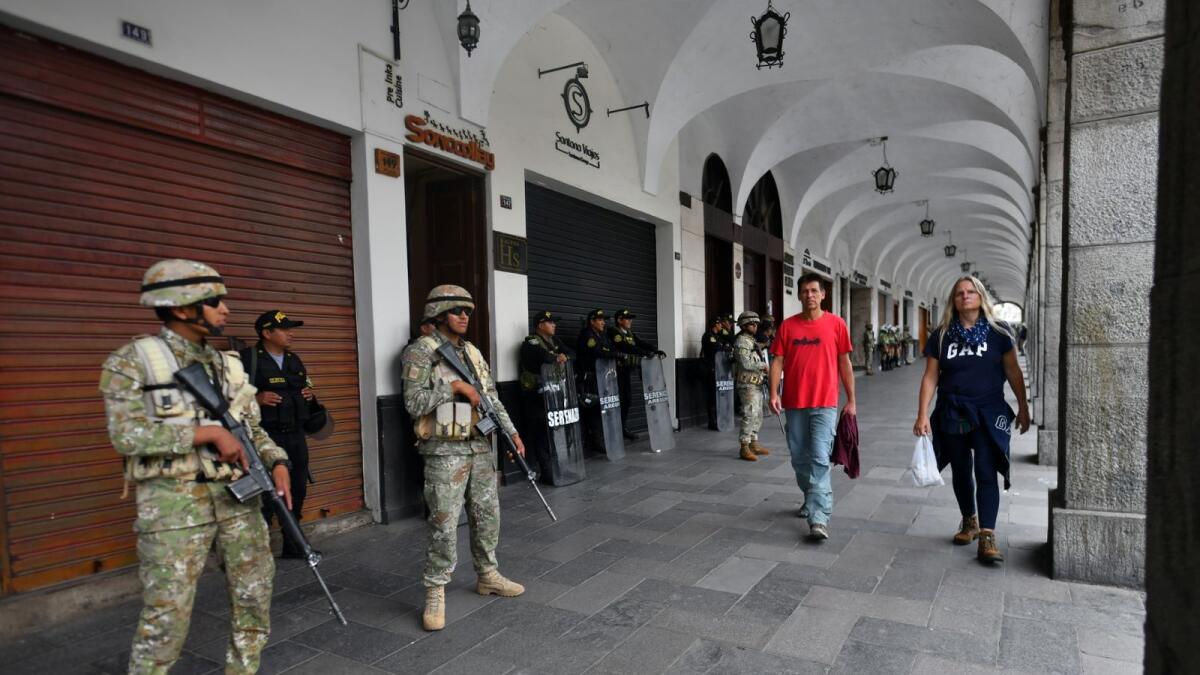Peru declares state of emergency as ousted leader remains in prison
Violent protests erupted in country after arrest of former president Pedro Castillo

AFP
Peru declared a nationwide state of emergency Wednesday amid violent protests against the ouster of ex-president Pedro Castillo that have left seven people dead.
The announcement came as a judge ordered Castillo to remain in prison on charges of rebellion and conspiracy for another 48 hours ahead of a release hearing.
Nationwide protests and roadblocks continued Wednesday after Castillo's arrest last week for trying to dissolve Congress and rule by decree.
Defence Minister Alberto Otarola announced the new 30-day state of emergency due to "acts of vandalism and violence, roadblocks."
He said the measure involved "the suspension of the freedom of movement and assembly" and could also include a night-time curfew.
The new president, Dina Boluarte, again moved to ease tensions by calling for elections to be brought forward, this time to December 2023.
On Sunday, Boluarte had already said she would seek to advance elections from 2026 to 2024, but that did not appease Castillo supporters demanding his release and early elections.
Last week, a judge ordered Castillo to be held for seven days, and he was meant to be released on Wednesday.
However, prosecutors filed a request late on Tuesday to hold him in pre-trial detention for 18 months.
Judge Juan Checkley on Wednesday postponed a hearing on the new request until Thursday after defense attorneys argued they had not received all documents from the public prosecutor.
He also ordered Castillo to remain in detention for another 48 hours.
"Enough! The outrage, humiliation and mistreatment continue," wrote Castillo on Twitter, adding that he would petition the Inter-American Commission on Human Rights to "intercede."
Castillo, a leftist former school teacher, was in power for only 17 months in the South American nation that is prone to political instability and is now on its sixth president in six years.
His short period in office was marked by a power struggle with the opposition-dominated Congress, and six investigations into him and his family mainly for corruption.
Castillo was facing his third impeachment bid when, last Wednesday, he announced he was dissolving Congress and would rule by decree.
But lawmakers went ahead and voted to sack him and he was quickly arrested while trying to flee to the Mexican Embassy and seek asylum.
Boluarte, who was Castillo's vice president, was sworn in as his successor.
Her attempts to calm tensions have failed, including an earlier state of emergency in several flashpoint regions.
Boluarte has now twice proposed advancing elections.
"Legally it works for April 2024, but by making some adjustments we can bring them forward to December 2023," she told reporters.
Rights ombudsman Eliana Revollar told AFP on Tuesday that things could still get worse.
"This is a very serious social convulsion. We fear that it will lead to an uprising because there are people calling for an insurrection, who are asking to take up arms," said Revollar.
Five people were killed in clashes between protesters and security forces on Monday, following another two on Sunday.
Six of the seven deaths have been in the Apurimac region, where Boluarte was born.
On Tuesday, Castillo called his arrest unjust and arbitrary and said he would "never give up and abandon this popular cause that brought me here."
He also called on security forces "to lay down their arms and stop killing these people thirsty for justice."
Protesters have set up roadblocks in numerous regions.
The worst-hit areas are in the north and south, including the region of Cusco, a tourism lure that is home to the Machu Picchu Inca citadel, and Peru's second city, Arequipa.
In Lima, dozens of demonstrators threw stones at the police on Tuesday evening as they tried to reach Congress, with the police firing tear gas to disperse them.
Indigenous and agrarian organizations called an indefinite strike to begin on Tuesday, forcing the train service between the city of Cusco and Machu Picchu to be suspended.
It left many tourists stranded at the tourist site, according to Machu Picchu mayor Darwin Baca, who asked for help evacuating them.




